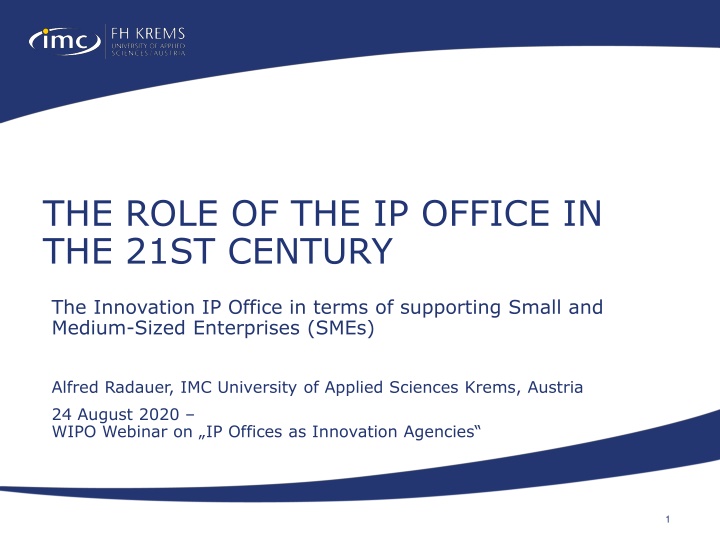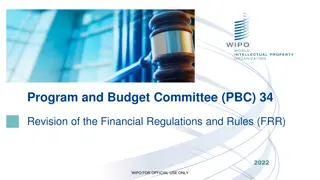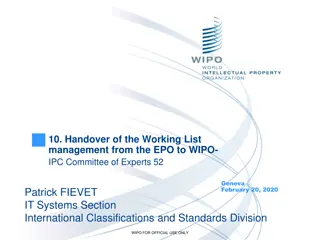
IP Office Support for SMEs in the 21st Century
Explore the evolution of IP offices towards greater service orientation and support for small and medium-sized enterprises (SMEs). Learn about the innovative roles of IP offices, types of services provided, and the institutional set-up facilitating innovation in the IP ecosystem. Discover how IP offices are adapting to meet the changing needs of businesses in the modern era.
Download Presentation

Please find below an Image/Link to download the presentation.
The content on the website is provided AS IS for your information and personal use only. It may not be sold, licensed, or shared on other websites without obtaining consent from the author. If you encounter any issues during the download, it is possible that the publisher has removed the file from their server.
You are allowed to download the files provided on this website for personal or commercial use, subject to the condition that they are used lawfully. All files are the property of their respective owners.
The content on the website is provided AS IS for your information and personal use only. It may not be sold, licensed, or shared on other websites without obtaining consent from the author.
E N D
Presentation Transcript
THE ROLE OF THE IP OFFICE IN THE 21ST CENTURY The Innovation IP Office in terms of supporting Small and Medium-Sized Enterprises (SMEs) Alfred Radauer, IMC University of Applied Sciences Krems, Austria 24 August 2020 WIPO Webinar on IP Offices as Innovation Agencies 1
Innovation policy on IP The typical / traditional view A topic largely at the fringe: Patent counts Technology transfer No discussion of IP offices Source: Kuhlmann & Arnold, 2001 2
The path towards becoming innovative as IP office Because of actual transformation towards more service- orientation (new public management) Because of need to find new business / activity (in addition to and/or in lieu of examination) Different levels of innovation Does more than what the traditional IP office does (type A ), like having dedicated SME support services Does improve on traditional registration/examination (type B ) Particularly/recently or constantly innovative, in addition to type A and B (type A.1 or B.1 ) 3
A typical institutional set-up Patent attorney Private Consultants - support in anything Chamber of commerce - Consultation & information - training Single SME Innovation support National innovation funding agency - start-up support - business growth support - innovation support programmes Regional funding agency - Start up support - business growth support - Innovation support programmes National R&D funding agency - R&D grants -Thematic programmes Patent Office -Associated with filing of patents PIC, TTO Uni- versity IPR support 4
Types of IP services provided Typology *) 1. (Pro-active) awareness raising activities and public relations 2. (Passive) information provision services 3. Training 4. Customized in-depth consulting and advisory points/services 5. Financial assistance & legal framework Benchmarking studies have shown that only few services perform well In the recent past, many activities in relation to tool and service development (at European level: IPorta, VIP4SMEs ) Many IP offices have restructured their service offerings Some trend towards IP Audit -type services Major offerings in relation to basic information and patent search 5
Things to remember when dealing with SMEs in policy debates on IP There is no such thing as the SME. SMEs may not be too much into patenting, but a differentiated view may be necessary whether this is truly a bad thing. SMEs can be on both the right holders and the (alleged) infringer end of IP enforcement. Reaching out to SMEs to support them needs consideration in terms of the how , with what and when . SMEs usually don t like lawyers, but they like good business. As for an IP office: How much do you want to / can you depart from your role as impartial state pre-grant institution (market and systems failure argument)? 6
10 important good practice elements concerning IP support services for SMEs 1. Integrated approach to IP and focus on IP management skills (rather than on driving IP, particularly patent, filings numbers) Business, rather than legal approach e.g., why instead of how to patent e.g., as part of business support Language (!) 1:1 approaches are usually preferable Good collaboration with the private sector of IP attorneys (delineate private from public offerings) Adaptation to the specific industry structure in the country Prime factor: Expertise of service-delivering staff Might be worthwhile to pool into a central unit Are the (patent/trademark) examiners fit for purpose? Timely delivery of service Ease of identification Collaboration with business intermediaries to reach out to SMEs 10. Evaluation culture 2. 3. 4. 5. 6. 7. 8. 9. 7
8 Key quality factors for IP services 77 12 Competence of Staff 67 17 Ease of access & identification 67 19 Timely delivery 51 31 Source: Radauer et al. 2007 Costs Aggregated answers for all services, Services considered = 15 49 26 Individual contact Information on different IP strategies ("why/why not to patent") 47 24 n = 630 Scope of service 44 33 Administrative efforts 42 31 Technical information ("how to patent") 40 25 Referal to & availability of other services in-house 29 35 Referal to external services 26 35 Spatial distance 14 31 % 0 high relevance 10 20 30 40 50 60 70 80 90 100 medium relevance 8
Thank you! For further information, please contact: alfred.radauer@fh-krems.ac.at 9






















